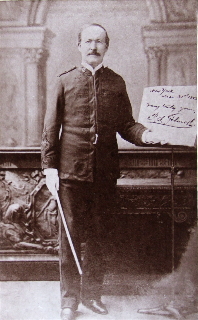Bandleader, impresario, and composer P.S. Gilmore helped create music traditions that resonate in American culture today, with particular relevance to Boston. In the latter half of the 19th century, Gilmore expanded public listening environments, broadened repertoire, and master-minded jubilee festivals of unprecedented scope. The Irish-born Gilmore also wrote the well-known song, "When Johnny Comes Marching Home."
Summer 2012 marks the 140th anniversary of the World's Peace Jubilee and International Music Festival, organized by Gilmore and held June 17-July 4 1872 in Boston, Massachusetts. The O'Neill Library exhibit from the Burns Library's Michael Cummings Collection of P.S. Gilmore Materials highlights just a few of Gilmore's contributions to Boston's cultural history.
For additional information on Patrick Sarsfield Gilmore, please read the 2004 Burns Library exhibit titled: Patrick Sarsfield Gilmore, 1829-1892: Father of the American Concert Band contact the Burns Library Irish Music Center at imc@bc.edu.
Listen to Cylinder Recordings by Gilmore's Band
From 1873 to his death in 1892, P.S. Gilmore conducted the 22nd New York Regiment Band, helping it become the foremost professional band in the United States. Gilmore made some of the first recordings for Thomas Edison, and "Gilmore's Band" continued recording after Gilmore's death in 1892.
"Boston Commandery March" by Thomas M. Carter, recorded circa 1899 (YouTube video)
"New Colonial March" by Robert Brown Hall, recorded circa 1904-1909 (Streaming audio from the University of California, Santa Barbara Library)
For additional recordings by Gilmore's Band from the UCSB Cylinder Preservation and Digitization Project go to http://cylinders.library.ucsb.edu/ and search "Gilmore's Band."

